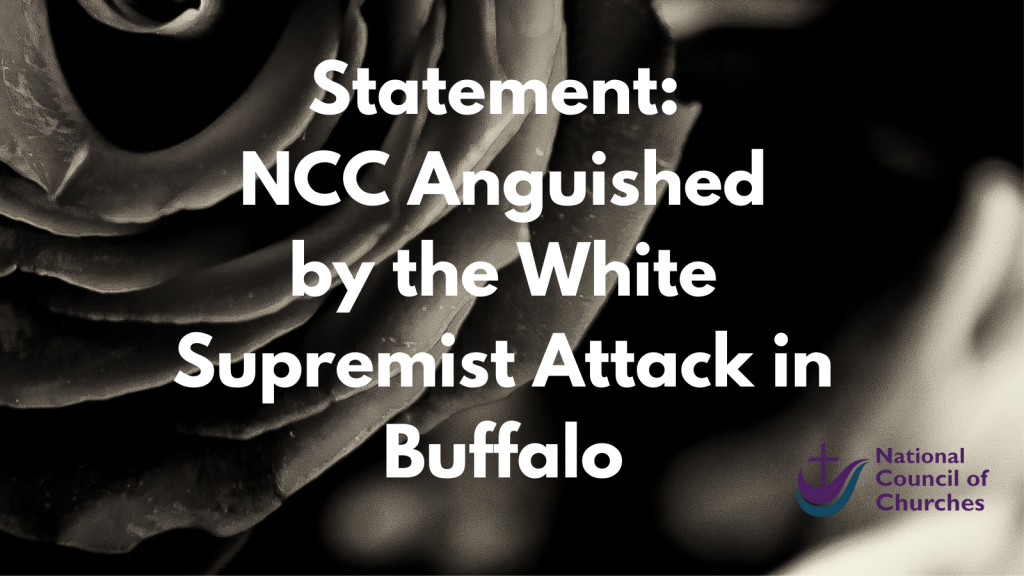The National Council of the Churches of Christ in the USA (NCC) laments the lives lost and shattered on Saturday by the act of White supremacist terrorism that killed 10 and wounded three at a supermarket in a predominantly Black neighborhood of Buffalo, New York. We are once again devastated by a targeted attack of the Black community and feel the outrage and shock that an 18-year-old learned online to hate to such an extreme that he would commit these atrocious, wicked acts of murder.
In this moment, the Prophet Habakkuk’s cry echoes our own:
O Lord, how long shall I cry for help, and you will not listen? Or cry to you “Violence!” and you will not save? Why do you make me see wrongdoing and look at trouble? Destruction and violence are before me; strife and contention arise. So the law becomes slack, and justice never prevails. The wicked surround the righteous; therefore judgment comes forth perverted. Habakkuk 1:2-4 NRSVue
The White supremist ideology that authorities attribute to the gunman in a 180-page manifesto references “replacement theory,” far-right extremist rhetoric about people of color replacing White Americans, which was once on the fringe and is now being shared more widely by right-wing television channels and politicians. We cannot help but acknowledge that politicians, citizens, and even some faith leaders, are working to stop crucial Black history teachings from the past while children instead learn White supremacy in the present.
According to Bishop Vashti McKenzie, NCC’s Interim President/General Secretary, “Our communities have not healed from the onslaught of violence from past White supremist attacks and now the scabs have been ripped off to bleed again,” she said. “This racial violence has to stop. We must all increase our efforts to bring racism to an end and that will not happen by only making ceremonial or performative gestures that don’t get to the root causes of the problems. We have to do the deeper work. This is especially true for Christians.”
After holding a Governing Board retreat in Montgomery, Alabama this month and visiting The Legacy Museum, we see the direct connection between the shooter’s intent to commit an act of terrorism and America’s extensive history of lynchings and policy decisions meant to intimidate and dehumanize the Black community.
We clearly see the injustices evident in all aspects of this shooting. We see it when the teen arrested had previously been reported as a threat and released. We see it in the way in which he was taken into custody. We see it in the fact that east Buffalo was a food desert before this grocery store was built and now the predominantly Black neighborhood has no reliable source for food. We see it when the majority of Americans want common sense gun legislation but politicians refuse to pass the necessary laws and the Supreme Court considers striking down gun restrictions.
As part of our ACT NOW to End Racism initiative (Awaken, Confront, Transform), the NCC calls for commitments on three levels. Individually, all members of our communions are encouraged to commit to the inner work of becoming aware of the deeply-rooted and ever-present racism in each of our lives, and resolve to dismantle it. Locally, ministers are invited to commit to ongoing direct communication with parishioners, including through preaching and teaching, that confronts racism. Remaining silent encourages and affirms the growing threat of White supremacy. Nationally, we must work to transform the hearts, minds, and behaviors of people and fight for policies that change the very structures that shape society in which racism is engrained.
In addition, we urge Congress to be courageous and determined in its resolve to pass common sense gun control legislation as well as legislation that will bring an end to systemic racism and begin to repair the harm done in the past to include HR 40 and the John Lewis Voting Rights Advancement Act.
“We see this shooter referencing past ‘mentors of massacres’ from Atlanta and New Zealand and we press people to respond,” stated Bishop McKenzie. “We must continually seek opportunities to plant seeds of love that recognize the humanity of all people in order to detoxify the planted seeds of hate and realize “Beloved Community.”

